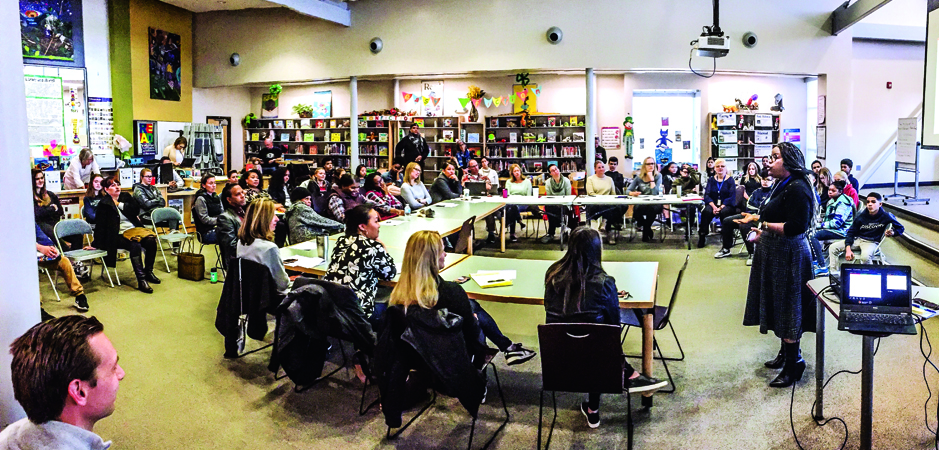
Parents and community members engage in a wide-ranging morning conversation as Jennifer Bacon shares possible paths forward.
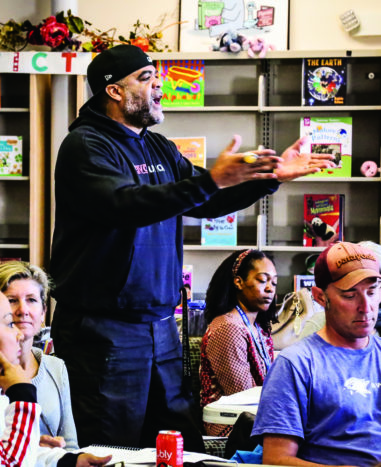
Soul Ashemu imparts his vision for DDS, and promises “to advocate or agitate” to safeguard the school’s future.
DPS called three community meetings in a five-day period in March at Denver Discovery School to present reduced enrollment projections and their financial impact on the school. In light of the news, parents, staff, students and other supporters turned out in large numbers and got to work on a plan to revitalize the school.
For the Denver Discovery School (DDS) community, the end of the first round of SchoolChoice brought worrisome news. DPS adjusted the school’s 2019-20 enrollment projections downward, from 181 to 136 students. Since school funding is tied to enrollment and DPS, as a rule of thumb, regards a school population under 150 as untenable, this shift places the innovation school at a crossroads.
How Did We Get Here?
Turnover and Disciplinary Practices
Despite the low projections, the mood at a series of March meetings was upbeat as current and past DDS parents, teachers, students, community members, district administrators, and school board members came together on three occasions to consider how to move forward. Rallying around Discovery, some participants touched on past missteps that led DDS to this juncture.
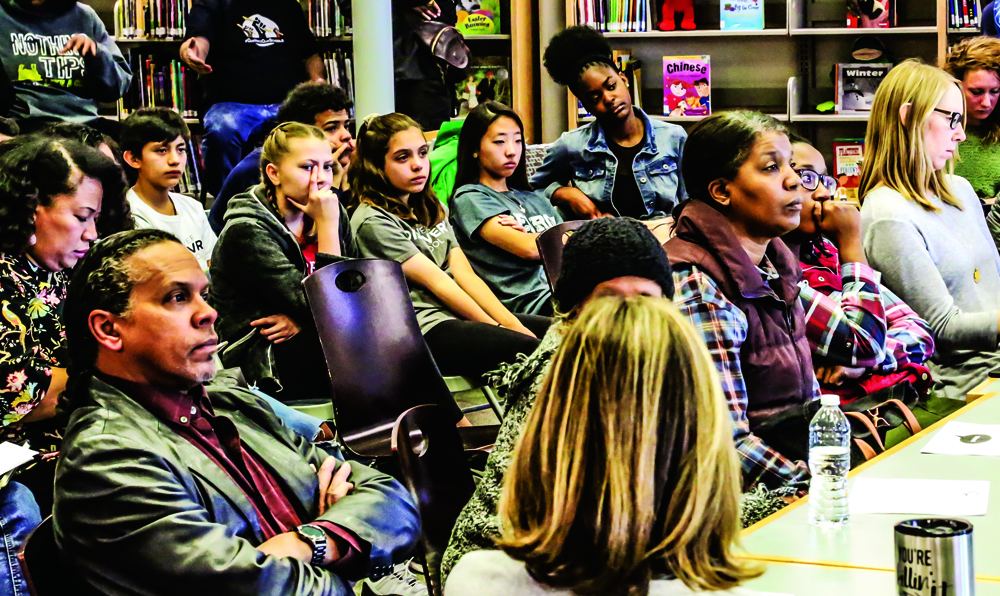
At the March 20 morning meeting, students left class and joined parents at the meeting about their school’s future.
The past is a tricky subject at a school that has seen four principals in five years, and enormous teacher turnover for many of those years. News of the most recent principal turnover came in January 2019, when the current (and fourth) principal, Pam Kirk sent a letter to parents stating she will leave at the end of the current school year “due to a variety of reasons.”

From left, DCTA NE area union rep; Pam Kirk, DDS principal; Latisha Cain, nurse for both schools on the shared campus; Shelby Dennis, principal of Swigert Elementary, which shares the campus; far right, Patricia Williams, 7th grade language arts teacher.
Staff retention has been an ongoing challenge. “I saw turnover from 40-80% from the time I got there…If that many of your people are jumping off board every year, you can’t have consistency. I think that’s the real problem. I got a new team every year,” says Dorian Bennett, DDS’ former Dean of Students. By all accounts, DDS hired outstanding teachers; however, newer and younger teachers did not always enjoy command of the classroom the way veteran teachers could. Micro-management of teachers impelled some to leave and other did not renew their contracts after realizing that teaching was not their calling.
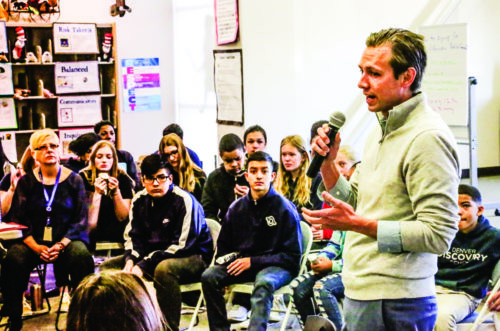
DPS Director of Financial Planning & Analysis and Budget, Chuck Carpenter explains that with student-based budgeting, money follows students. When students move to a different school, the budget of the school they leave is reduced.
After founding principal Kristen Atwood’s abrupt departure less than a week before the 2017-18 school year began, Bennett worked with two interim principals and the current principal. With new principals came a shift in disciplinary practices. Bennett says one interim principal did not trust him to base his disciplinary decisions on individual students’ needs. Lacking an understanding of the school culture, Bennett says, she directed him to send students home for infractions.
Keenly aware of the school-to-prison pipeline, Bennett believed this was the wrong approach, and it disproportionally targeted minority youth. “Half the time this [suspensions] makes things worse, because when the kids come back to class, they’re behind.” He says for most students, this exacerbates behavior issues. “Instead of looking like a fool in front of everybody, I’ll exhibit a behavior.”
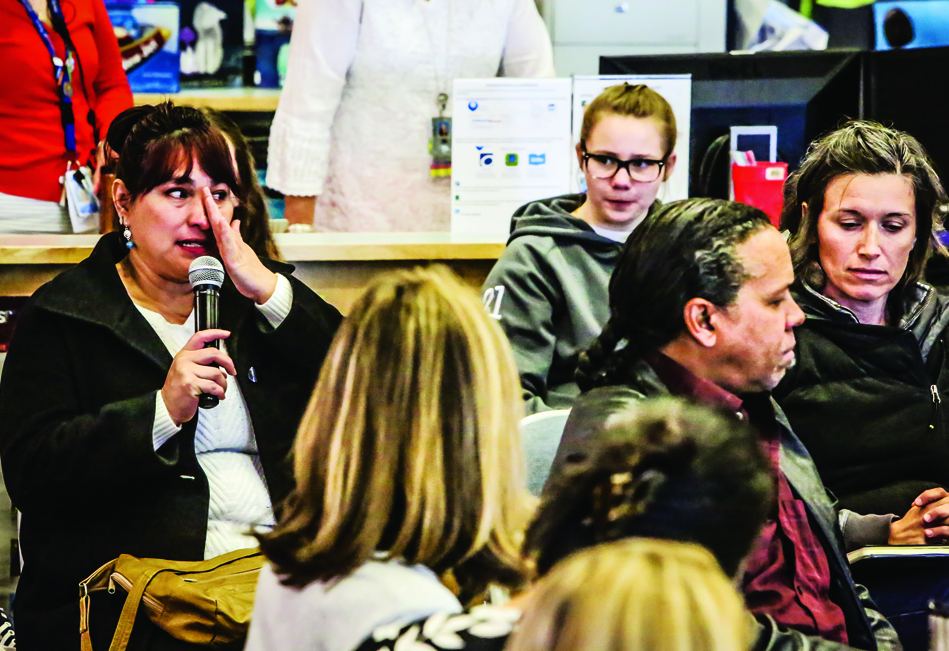
Many parents spoke emotionally about school issues that have affected their children—in both positive and negative ways. Above Teresa Hartgers talks at the third meeting, held Wednesday, March 20.
In 2017-18, DPS introduced “No-Nonsense Nurturing” or “NNN” at DDS. CT3 trains teachers in this model, and its website states that NNN builds academic success through “precise directions, positive narration, and fair, consistent accountability systems.” Some schools see success in reduced behavioral problems and suspensions, but nationally, the practice is most commonly found in charter schools and those with predominantly Black and/or Hispanic populations, according to a National Public Radio report. “I don’t like when kids can’t talk and do things in the hallway, and when they can’t show up as their unique selves in classrooms and common spaces,” says Bennett.
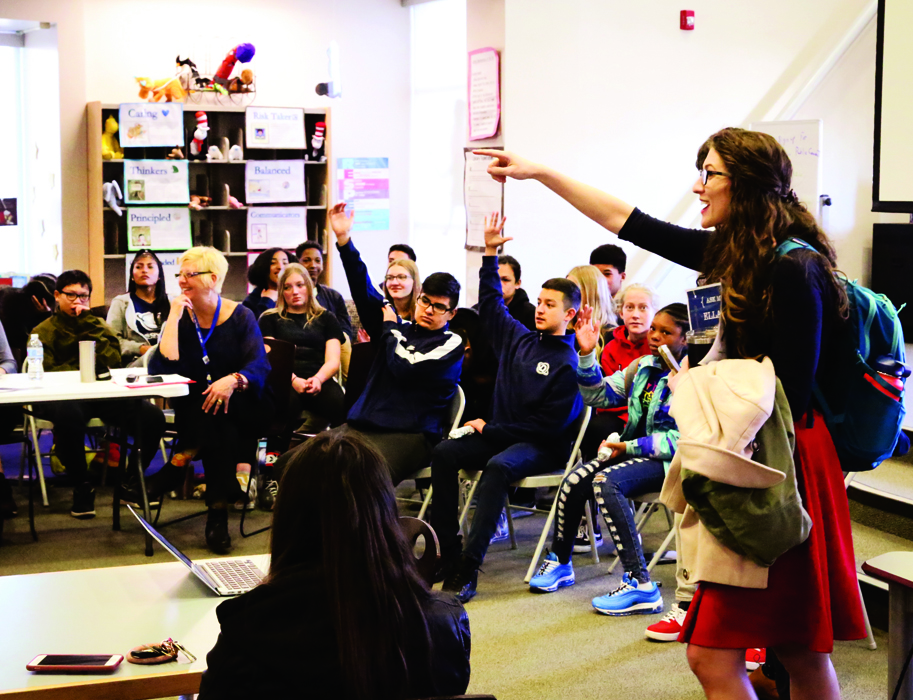
Teacher Melea Mayen says she can relate to the difficulties and emotions middle school students experience, adding, “I think I cried 90% of the time in middle school.”
After weathering the school’s growing pains for 3.5 years, Bennett left DDS at the end of the last school year to become Head of School at the Boys School of Denver (a charter school), which did not require a principal’s license upon hiring to lead the school. The lack of a license had made Bennett ineligible to take the helm at DDS. “DDS is still close to my heart. I found my wings there, and I will always be an Owl!”
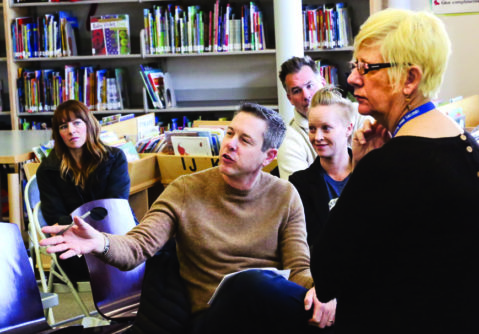
DDS parent Dave Ungemah was one of a number of parents at the meetings who said they had opted for a different school for 7th or 8th grade rather than staying at DDS. Teresa Becker, Office of Family and Community Engagement is one of DPS staff who will be working with families as they reimagine the school.
Looking to the Future
School Board member Jennifer Bacon explains that DDS is a curious case for the district. Unlike low-performing, low-enrollment schools targeted for closure, DDS boasts rising test scores in an area of the city that needs middle school seats. “Where you have a zone like the Greater Park Hill/Stapleton Zone, where all the options are good, what happens when something dips? A shift in perception and instability here threw enrollment out of whack.”
She publicly shared three possible paths for DDS: 1) Keep the school open; 2) Close it; or 3) Use 2019-20 as a “Year Zero,” maintaining grades 7 and 8 for current students only while the community revitalizes and reinvests in the school. It’s clear that nobody wants the school to close, and DPS has agreed to help with the budget, though DDS would still face a shortfall.
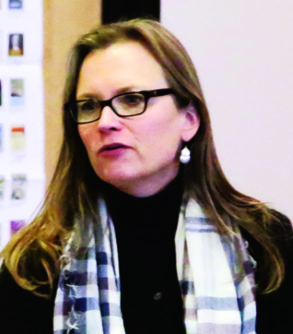
School Board Member Carrie Olson, Ph.D., along with Jennifer Bacon, attended all three meetings.
Based on overwhelming attendance at 3 community meetings in March, (over 150 at one evening meeting), and vocal determination to keep the school open, community members are moving forward with option 3. Bacon and fellow Board Member Dr. Carrie Olson publicly declared that they will support the community’s effort to develop a plan for the school. Though ultimately the decision will rest with Superintendent Susana Cordova, the community and the School Board are essential voices.
In partnership with DPS’ Office of Family & Community Engagement, Hasira “Soul” Ashemu, founder and CEO of the nonprofit Breaking Our Chains, leads the effort to give voice to parent and community concerns and develop a plan for DDS’ future. Our Voices Our Schools, which is a program of Breaking Our Chains, is premised on the idea that education is a human right, and works to reduce inequities that appear in the guise of charter schools, co-locations, etc.
Charismatic and energetic, Soul is also the father of two DDS students. His commitment to DDS is palpable as he shares his vision for it becoming “a loving community school” that is a community hub, serving it not just during school hours, but in a range of programs for parents and youth after the school day ends. “When you have resources, your schools are automatically community schools. They are where families circle and gather. The only difference is in marginalized neighborhoods it has to be an intentional process where you pull in nonprofits to provide wraparound services.”
To reimagine what DDS might look like in the future, the community formed 4 working groups: Innovation & Redesign; Funding & Finance; Community Wraparound Services: and Curriculum & Instruction. All are invited to participate by joining the discussion at 6pm in the DDS library on Wednesday nights in April.
The Elephant in the Room:
Shifting Demographics
Underlying conversations around DDS are issues of race and ethnicity. Bennett cites tracking in determining students’ schedules and disproportionate disciplining of minority students among the concerns he shared with principals.
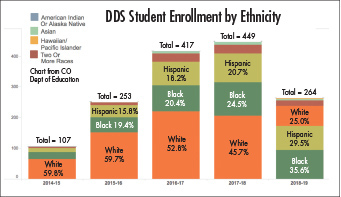
Denver Discovery School opened in 2014 with the 6th grade class only. A grade level was added each year until 2016–17 when it included grades 6–8. The building was originally designed to educate 360 students.
This school year, minority students comprise the majority at DDS (see graph). Given a shared campus with an elementary school population from the neighborhood that is overwhelmingly White, existing racial inequities at DDS are more pronounced.
“When the leadership began to flounder, White parents were very focused on who was leaving the ship…DDS going through instability doesn’t scare away Black families because this is what they are used to in their educational experience,” says Soul.
Bacon is aware of the flurry of social media posts decrying racism at DDS, and echoes Soul’s and others’ affirmation that the current crossroads is an opportunity for DDS and the community as a whole. “We are balancing very important emotions and social constructs. If ever there was an opportunity to rebuild and support the community in a way we can confront some of these issues, it would be with this school. The hardest part of change is the pain of the realizations. This neighborhood and this school’s future really have an opportunity to be an example for DPS.”
To be a part of the process to reimagine DDS, email Soul at soul@soulwatson.com. Jennifer Bacon appreciates emails concerning the school with “DDS” in the subject line at Jennifer_bacon@dpsk12.org.



I don’t understand why the community insists on keeping this school open when, even with district financial support, it will have to be a bare-bones operation. It seems to me that the most equitable thing for these students, who have already had to deal with so much change and chaos in their middle school years, would be to close the school (at least for a year for planning purposes) and send all current students to one of the other Stapleton middle schools, all of which are either high green or blue in SPF, meaning they’re very good or excellent schools, whereas DDS is orange (very nearly failing). My child, who is now in high school, attended DDS 6th through 8th grades. As soon as it started declining, I would have jumped on the opportunity to send him to a successful middle school. His experiences at DDS set the stage for high school, and had his middle school years been consistent rather than experiencing so many changes in leadership and teaching staff, he would have been that much more prepared for high school. Insisting on keeping DDS open seems to me to be sacrificing the current students in the name of “equity,” while actually maintaining an inequity for these largely minority students who deserve so much more than they’re currently getting.
Hi Andy, Thanks for your comment. I understand your concerns, as I also had a child who was at DDS for 3 years. In fact, I was similarly inclined before engaging in the conversations going on around the school now. Based on multiple meetings and conversations, my understanding is that there are several reasons to keep the school open: 1) closing schools generally is bad for communities (lots of literature on this, which I will spare you); 2) we need the middle school seats and there’s no room for those kids at other area middle schools; 3) parent and community momentum behind a reimagined DDS is tremendous, which is new for DPS and for DDS; 4) test scores—which are of course just one measure of a school—are in fact on the rise at DDS, so it is not a failing school